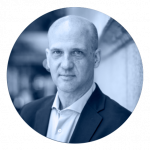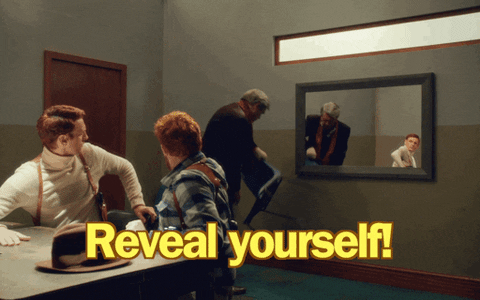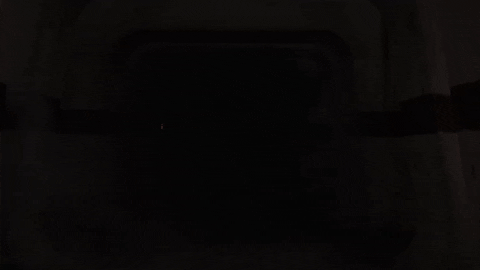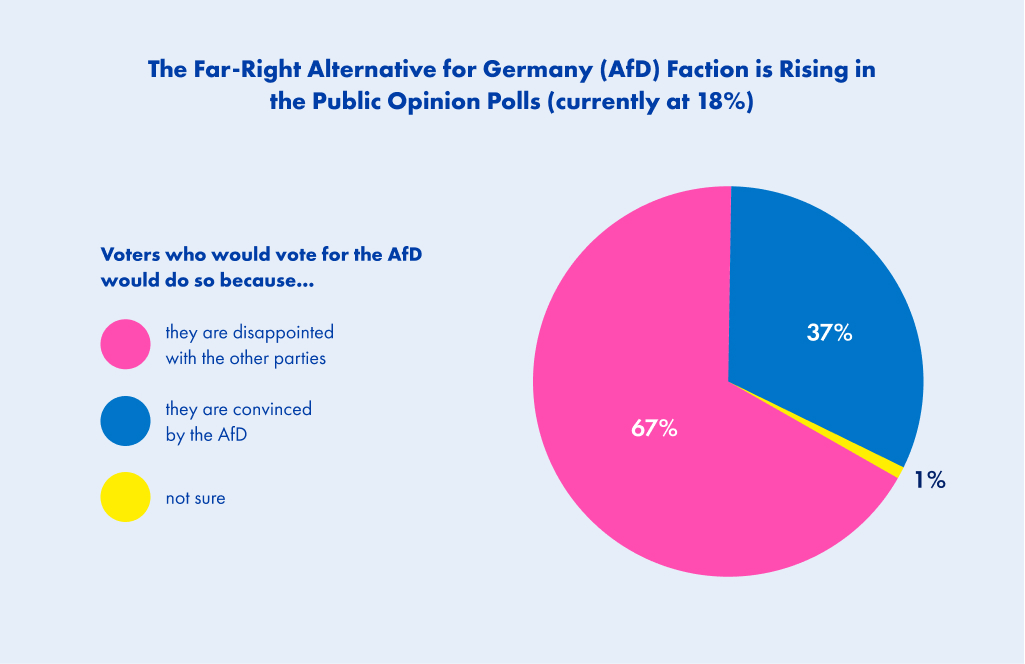Issue #131
Guten Morgen! Summer is finally here! Brussels has had more sunny days in the past week than the entirety of last year, and what better way to welcome these warm days than with an article from our esteemed guest contributor, Dr. Steven E. Sokol, President and CEO of the American Council on Germany. Check out the (Guest) House’s View to find out why, despite a laundry list of ongoing problems, Dr. Sokol retains a feeling of optimism. Furthermore, we bring you a quick overview of the political mess happening in Spain at the moment and a story on why a so-called “hammer” may smash the German government coalition to pieces. Finally, take a peek at Szilvia’s WOOM to hear more about past responsibilities and easy answers. Happy reading! Anna Szilvia Spain Votes… and then Votes Again If you’ve been paying attention to electoral trends in Europe over the past few years, you will have noticed one clear development: a gradual, but persistent drift to the right. I’m not only talking sharp turns towards the far-right like in Italy and France, but also towards the more moderate right, like in Greece, and – as demonstrated by this past week’s regional elections – in Spain. On Sunday, Spaniards went to the polls to vote for 12 regional governments – 10 of which were controlled by Prime Minister Pedro Sánchez’s Socialist Workers’ Party (PSOE). After the elections, the PSOE only managed to hold on to three. Collecting 31.5% of votes, the center-right People’s Party (PP) went home with the chicken dinner. That being said, the PSOE is not taking this defeat lying down. On Monday, Sánchez decided to dissolve the parliament and call for national elections towards the end of July. He hopes to take the wind out of the PP’s sails by letting the people “define the political course of the country.” And he’s not being hyperbolic. With relative certainty, neither the PP nor the PSOE will receive an outright majority. This means: coalition. Looking at the Spanish political landscape, the only options are collaboration with the far right and far left. To add to the mess, the situation on the far left is anything but harmonious at the moment. Two left-wing parties who are normally at odds with one another have recognized how dire the situation is and are racing to form a coalition to unite everyone left of the PSOE. Only issue: they have 10 days to reach an agreement, otherwise they miss the window to register for the elections. Oh, and Spain takes over the Presidency of the Council of the EU in July. Can Sánchez survive? Is the future of Spain veering right? We’ll keep you updated. Will the “Heating Hammer” Smash the Traffic Light? Germany’s “traffic light” coalition wants to make Germany climate-neutral by 2045 – but the “how” has triggered numerous discussions so far. Green Minister for Economic Affairs, Robert Habeck, wants to massively accelerate the heating turnaround by amending the Building Energy Act. The draft act calls for gas and oil heating systems to be replaced and for renewable energies such as heat pumps to be used instead. Thus, only heating systems that produce heat from at least 65% renewable energies are to be installed from 2024. Opposition on the right (and even from within the coalition sometimes) have called the law Habeck’s “Heating Hammer.” Up to now, there has been a lot of grumbling about the heating act: from the FDP about the draft law, and from Habeck about the FDP. The minister even accused the coalition partner of “breaking its word” because the FDP prevented the bill from reaching its first reading in the Bundestag as agreed, even though the bill was already approved by cabinet. The FDP is mostly calling for more technology openness, such as the continued use of wood or wood pellets for heating. This week’s attempt to find a compromise failed. Habeck invited the rapporteurs of the three traffic light parliamentary groups to answer 77 questions posed by the FDP rapporteurs. The conflict, mostly between the FDP and the Greens, has escalated to such an extent that the issue is becoming a crucial test for the traffic light coalition and threatens the government’s ability to act. The Greens and SPD are pushing for the law to be passed before the parliamentary summer recess on July 7. So far, the liberals seem in no rush to give up their blockade and are calling for thoroughness over speed. THE (GUEST) HOUSE’S VIEW: by Dr. Steven E. Sokol, President and CEO of the American Council on Germany “It’s all interconnected!” In almost every direction we look, we are faced with tremendous challenges – from Putin’s brutal invasion and the war in Ukraine to ongoing tensions with China; from waning confidence in democratic institutions and practices to the radicalization of far-right movements in democratic countries; and from serious concerns over climate change to creating economic opportunities for all. The list goes on… Things are pretty bleak, but when I sat down to write my monthly Krautshell column, I had a sense of hope and a feeling of optimism. In my last column in early May I recognized that Germany has come a long way since February 2022 – but that it still has a lot to do to live up to the Zeitenwende. Just days later, German Chancellor Olaf Scholz surprised us when he put his money where his mouth is and announced a military support package to Kyiv of nearly three billion dollars. (Was someone in the Chancellery reading the Krautshell? 😉 ) Where does my sense of optimism come from? Germany is Stepping Up its Support for Ukraine With the announcement of a major arms package to provide more tanks, armored vehicles, and air defense systems to Ukraine, we are seeing a major step in Germany’s commitment to supporting Kyiv in its battle against the Russian invasion. The announcement came just before talks between Chancellor Scholz and President Volodymir Zelinsky – and can be seen as an attempt to “reset” the relationship between the two countries after Germany’s hesitancy to provide weapons. This commitment makes Germany the second largest supplier of aid and arms to Ukraine after the United States – and the largest contributor in Europe. It also paved the way for talks about supporting Kyiv with fighter jets on the sidelines of the G7 Summit in Hiroshima. One journalist who accompanied the Chancellor to Japan told me that this was a “big breakthrough” for Scholz. He is still relatively new on the world stage – certainly in his role as Chancellor – and he seems to have gained confidence. There was some reporting that Scholz was working behind the scenes on the sidelines of the summit to shore up an “international coalition” to give Kyiv fighter jets and help train Ukrainian pilots to fly them. The question is why did it take so long to agree to send heavy battle tanks followed by relatively little debate over fighter jets. But, the main take away is that the German, European, and G7 commitment to support Ukraine was on strong display last month. Germany is on the right track. Let’s hope it stays that way. There’s a “New Generation” Earlier this week, I had the honor to lead a discussion with Ricarda Lang, the Co-Chair of the German Green Party – who one of my colleagues described as “kick-ass.” At 29, she is the youngest chair in the German Green Party’s history. We talked about the very real domestic threats to democracy in Germany, in countries across Europe, and even in the United States – and specifically the radicalization of right-wing extremist groups. We also discussed what measures need to be in place to strengthen democratic institutions and practices. It was like peeling back an onion. With every question and every answer we uncovered more and more, layer after layer. We talked about social equity and the just transition, and about the need to get more people involved in the political process – by giving them the courage to run for office, starting at the local level. When it comes down to it, the radicalization on the political fringes often stems from a lack of opportunity and a sense that one’s concerns are not being heard. Lang made a compelling case that “everything is connected” – and that through a socially just transition we can provide economic opportunities. Lang also talked about a “new generation” at two levels. Young people see these challenges and are eager to address them. The Ampelkoalition also represents a new generation of political leadership. It came into office with an ambitious agenda, but had a steep learning curve and was then side-tracked by the war in Ukraine. Perhaps in the second two years in office, the coalition will be able to tackle some of the social, economic, and infrastructure challenges it set out to address. Is the Glass Half Full? I‘m not sure if my sense of optimism is justified. It is not clear to me that Berlin will heed the clarion call that it is imperative to take deliberate action to address the myriad issues that are defining our time. The three-party coalition came into power with a pledge not to air its dirty laundry in public. The coalition negotiations were a case in point. Everything took place behind closed doors. The coalition government is at its most difficult point and tensions are coming to the surface – largely due to differences between the Free Democrats and the Greens. The on-going divide over climate policy has been aggravated by a draft law, which aims to ensure that newly installed heating systems run on at least 65 percent renewable energy starting in 2024. With pledges from Olaf Scholz and his Defense Minister Boris Pistorius to support Ukraine “for as long as it takes” and leadership in providing military support, and with political leaders like Ricarda Lang who appears to understand the complexity and the interconnectedness of today’s challenges I have a sense of hope that things are moving in the right direction. THERE ARE NO EASY ANSWERS. FIND THEM. Marine Le Pen, Recep Tayip Erdogan, Viktor Orbán – many nations already have their very own Trump-like figure. Germany does not. This is unlikely to change in the short term due to the thoughtfully balanced post-WWII political system, which does not support the cultification of a specific person. However, from time to time, the true sentiment of German voters seeps through this carefully engineered system. Just one year ago at 10%, the far-right Alternative for Germany (Alternative für Deutschland, AfD) now reached 18% in a Germany-wide poll – the same as the Social Democrats (SPD), the party of the Federal Chancellor Olaf Scholz. While this does not pose an immediate direct threat on the federal level, it underlines the trend of disillusioned voters turning away from traditional parties and gravitating towards extremes. Sooner or later, the AfD will win elections in a federal state, leading to a completely new situation. As of yesterday, the entire German political elite is (again) looking for a bogeyman. And it’s true – the ongoing conflicts within the three-party coalition do little to foster trust. Also evident: The opposition is a lame duck, after having been in charge for over 16 years. But does playing the blame game really help? Surprisigly mature – and very out of character for leading German politicians, the General Secretary of the Liberals, Djir-Sarai, pointed out that the results “should be a cause for self-criticism for all democratic parties”. That’s a good start. However, merely searching for responsibilities in the past will not help to win future elections. Traditional German parties need to return to a more pragmatic approach and reestablish their connection with voters. Whether it’s regarding migration or the energy transition, including the greening of the heating systems in German households, they must bridge the gap between long-term ideals and the realistic implementation framework; otherwise, others will offer the easy answers. Issue #131


FIRST, SOME SOLID INTEL:
TAKE A BREAK, GIVE YOUR EYES A REST.

LONG STORY SHORT:
WHAT’S ON OUR MINDS:





